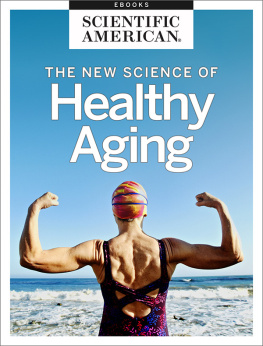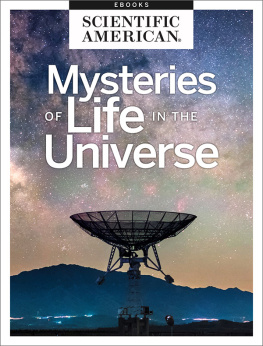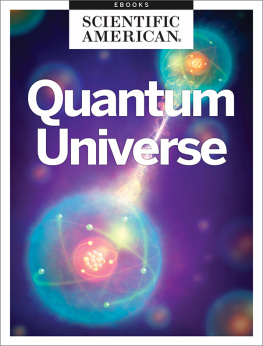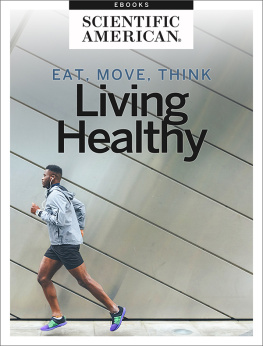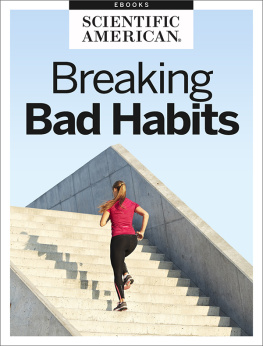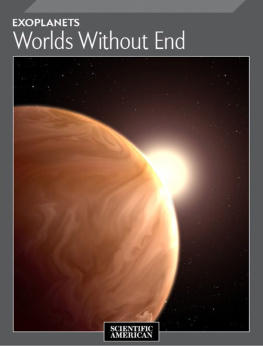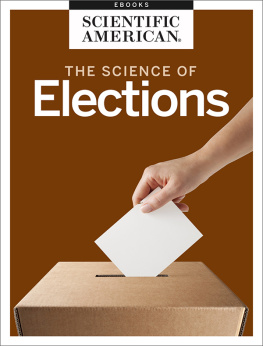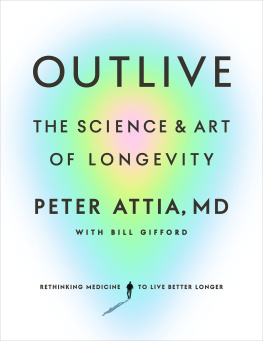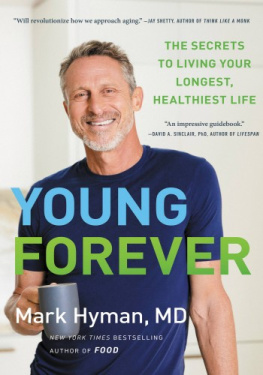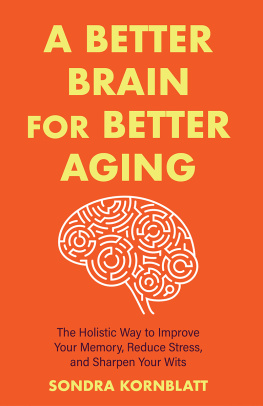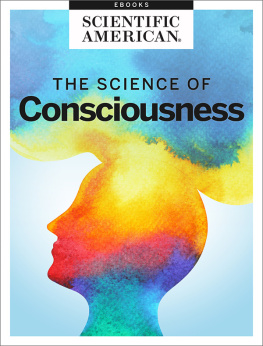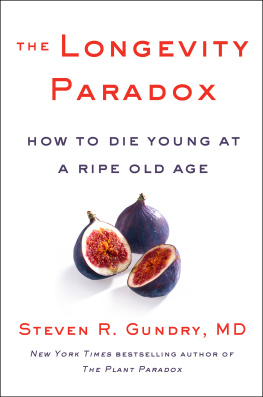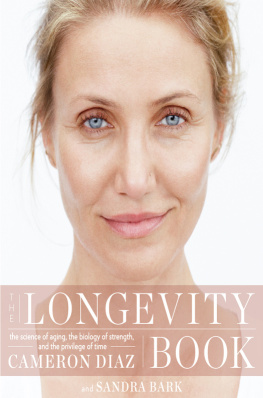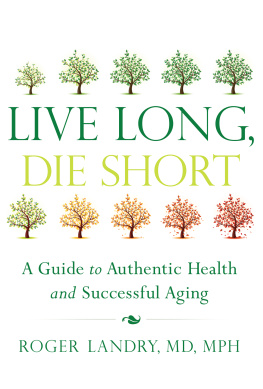Scientific American Editors - The New Science of Healthy Aging
Here you can read online Scientific American Editors - The New Science of Healthy Aging full text of the book (entire story) in english for free. Download pdf and epub, get meaning, cover and reviews about this ebook. year: 2019, publisher: The Rosen Publishing Group, Inc, genre: Science. Description of the work, (preface) as well as reviews are available. Best literature library LitArk.com created for fans of good reading and offers a wide selection of genres:
Romance novel
Science fiction
Adventure
Detective
Science
History
Home and family
Prose
Art
Politics
Computer
Non-fiction
Religion
Business
Children
Humor
Choose a favorite category and find really read worthwhile books. Enjoy immersion in the world of imagination, feel the emotions of the characters or learn something new for yourself, make an fascinating discovery.
- Book:The New Science of Healthy Aging
- Author:
- Publisher:The Rosen Publishing Group, Inc
- Genre:
- Year:2019
- Rating:3 / 5
- Favourites:Add to favourites
- Your mark:
- 60
- 1
- 2
- 3
- 4
- 5
The New Science of Healthy Aging: summary, description and annotation
We offer to read an annotation, description, summary or preface (depends on what the author of the book "The New Science of Healthy Aging" wrote himself). If you haven't found the necessary information about the book — write in the comments, we will try to find it.
Scientific American Editors: author's other books
Who wrote The New Science of Healthy Aging? Find out the surname, the name of the author of the book and a list of all author's works by series.
The New Science of Healthy Aging — read online for free the complete book (whole text) full work
Below is the text of the book, divided by pages. System saving the place of the last page read, allows you to conveniently read the book "The New Science of Healthy Aging" online for free, without having to search again every time where you left off. Put a bookmark, and you can go to the page where you finished reading at any time.
Font size:
Interval:
Bookmark:

The New Science of Healthy Aging
From the Editors of Scientific American
Cover Images: Peathegee Inc./GettyImages
Letters to the Editor
Scientific American
One New York Plaza
Suite 4500
New York, NY 10004-1562
or editors@sciam.com
Copyright 2019 Scientific American, a division of Nature America, Inc.
Scientific American is a registered trademark of Nature America, Inc.
All rights reserved.
Published by Scientific American
www.scientificamerican.com
ISBN: 978-1-948933-07-0


THE NEW SCIENCE OF HEALTHY AGING
From the Editors of Scientific American
Table of Contents
Introductionby Karin Tucker
Section 1
1.1
by John Hawkes
1.2
by Herman Pontzer
1.3
by Heather Pringle
1.4
by Thomas Flatt & Linda Partridge
1.5
by Robert M. Sapolsky
1.6
by Karen Wright
Section 2
2.1
by Bret Stetka
2.2
by David A. Bennett
2.3
by Shari S. Bassuk, Timothy S. Church & JoAnn E. Manson
2.4
by Shelly Fan
2.5
by Dan Hurley
Section 3
3.1
by Bill Gifford
3.2
by Linda Geddes
3.3
by Elie Dolgin
3.4
by Thomas T. Perls
Live Long and Prosper
The terrible twos. Growing pains. Quarter-life crisis. Dirty thirties. Middle age. For every stage of life in our journey as human beings, we've coined a term to describe the shared experience of growth that happens during that timeusually described in negative terms. In our youth-obsessed culture, billion-dollar industries have been built on the promise of looking and feeling youngerbut that state is never actually defined. Younger than what? Our brains fill in the blank as marketers intend: younger than we are right now. Whether were 25, 45 or 65, we should spend our years looking backward rather than forward, trying to capture a fleeting moment of optimal health and preserve it.
Understanding why we age and how to prevent age-related physical and mental decline can help us to live in the moment and enjoy our health at any age. Which is not to say that science has accepted the limits of human aging. The research to extend our natural lives continues, and in this eBook, we explore the latest thinking in healthy aging.
In Section 1 we look at how human beings have lived this long and the biological, environmental and social conditions that currently limit it. We begin with Still Evolving (After All These Years). Here anthropologist, John Hawks, explores how and why humans have rapidly evolved over the last 30,000 years. While in The Health-Wealth Gap, Robert M. Sapolsky, professor of biological and neurological sciences at Stanford University, shows how the stress of being poor inflicts serious damage on the mind and bodyin effect promoting faster aging and shortening lives.
In the next section, we survey recent developments in the prevention of age-related diseases. We begin with In Search Of The Optimal Brain Diet, by Brian Steka. This selection examines how the traditional diets from the Mediterranean, Scandinavia and Japan preserve psychological and cognitive well-being. While in Banking Against Alzheimers, neurologist David A. Bennett, looks how intellectual stimulation and social activities can bolster our brain to better withstand the physical changes that come with aging and dramatically reduce the risk of developing dementia. The remaining selections in this section focus on the impact of exercise and brain-training in strengthening cognitive health as we get older.
Finally, in Section 3 we investigate the limits of human aging. In Living To 120, Bill Gifford shows how drugs currently used to treat diabetes and cancer also exhibit the ability to keep aging cells healthy. While in The Oldest Old, Thomas T. Perls, an expert in the genetics of aging and exceptional longevity, examines how people over the age of 95 are often healthier than people decades younger than them. Here Perls explores how genetics protect some people from damaging biological processes that often occur in aging.
Although there is no cure for aging, there are certain things we can do to delay and mitigate the worst of its effects. In this eBook, we look at the recent research behind recent advancements made in this area and provide you with information (and realistic hope) as we all look toward tomorrow.
--Karin Tucker
Book Editor
Still Evolving (After All These Years)
by John Hawks
Humans are willful creatures. No other species on the planet hasgained so much mastery over its own fate. We have neutralized countlessthreats that once killed us in the millions: we have learned to protect ourselvesfrom the elements and predators in the wild; we have developedcures and treatments for many deadly diseases; we have transformed thesmall gardens of our agrarian ancestors into the vast fields of industrialagriculture; and we have dramatically increased our chances of bearinghealthy children despite all the usual difficulties.
Many people argue that our technological advancementourability to defy and control naturehas made humans exemptfrom natural selection and that human evolution has effectivelyceased. There is no survival of the fittest, the argument goes, ifjust about everyone survives into old age. This notion is morethan just a stray thought in the public consciousness. Professionalscientists such as Steven Jones of University College Londonand respected science communicators such as David Attenboroughhave also declared that human evolution is over.
But it is not. We have evolved in our recent past, and wewill continue to do so as long as we are around. If we take themore than seven million years since humans split from ourlast common ancestor with chimpanzees and convert it to a24-hour day, the past 30,000 years would take about a mere sixminutes. Yet much has unfolded during this last chapter of ourevolution: vast migrations into new environments, dramaticchanges in diet and a more than 1,000-fold increase in globalpopulation. All those new people added many unique mutationsto the total population. The result was a pulse of rapidnatural selection. Human evolution is not stopping. If anything,it is accelerating.
An Anthropological Legacy
Skeletons of ancient people have long suggested thathumans evolved certain traits swiftly and recently. About 11,000years ago, as people started to transition from hunting andgathering to farming and cooking, human anatomy changed.Ten thousand years ago, for example, peoples teeth averagedmore than 10 percent larger in Europe, Asia and North Africathan today. When our ancestors started to eat softer cookedfoods that required less chewing, their teeth and jaws shrank,bit by bit, each generation.
Although anthropologists have known about such traits fordecades, only in the past dozen years has it become clear justhow new they really are. Studies of human genomes havemade the recent targets of selection highly visible to us. Itturns out, for example, that descendants of farmers are muchmore likely to have a greater production of salivary amylase, akey enzyme that breaks down starches in food. Most peoplealive today have several copies of the gene that codes for amylase,AMY1. Modern hunter-gathererssuch as the Datooga inTanzaniatend to have far fewer copies than people whoseancestors came from farming populations, whether they livein Africa, Asia or the Americas. Getting a jump on starch processingat the point of entry seems to have been an advantagefor ancient farmers wherever they adopted starchy grains.
Font size:
Interval:
Bookmark:
Similar books «The New Science of Healthy Aging»
Look at similar books to The New Science of Healthy Aging. We have selected literature similar in name and meaning in the hope of providing readers with more options to find new, interesting, not yet read works.
Discussion, reviews of the book The New Science of Healthy Aging and just readers' own opinions. Leave your comments, write what you think about the work, its meaning or the main characters. Specify what exactly you liked and what you didn't like, and why you think so.

